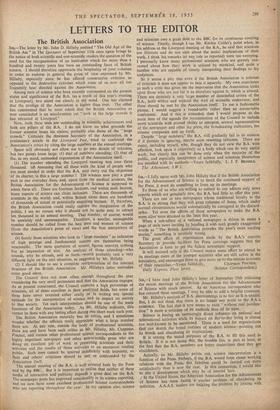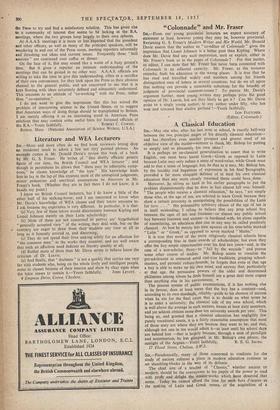Sul, —I have read John Hillaby's letter of September 11th
criticising the recent meetings of the British Association for the Advancement of Science with much interest. As an American correspondent who has covered these meetings, I may be able to add a helpful comment.
Mr. Hillaby's analysis of B.A. shortcomings is as fair as it is candid. But, I do not think that there is no longer any point to the B.A.'s existence. The fact that it now seems to exist " without real justifica- tion" is more a•criticism of its methods than of its aims.
Science is having an increasingly direct influence on national and international activities while its impact on day-to-day living is almost too well-known to be mentioned. There is a need for organisations that can sketch the broad outlines of modern science—pointing out Its trends and elucidating its implications.
It is among the stated purposes of the B.A. to fill this need in Britain. If it is not doing this, the trouble lies, in part at least, in the fact that the B.A. members are better researchers than they we elucidators.
Actually, as Mr. Hillaby points out, science interpretation is a function of the Press. Perhaps, if the B.A. would form closer working relations with the Press, this function could be carried out more satisfactorily than is now the case. In this connection, I would like to cite a development which may be of interest here. / In the United States, the American Association for the Advancement of Science has been facing a similar problem of elucidating its activities. A.A.A.S. leaders are tackling the problem by joining with
the Press to try and find a satisfactory solution. This has given rise to a community of interest that seems to be lacking at the B.A. meetings, where the two groups keep largely to their own spheres.
At A.A.A.S. meetings it is more or less expected that the president and other officers, as well as many of the principal speakers, will be wandering in and out of the Press room, meeting reporters informally and' thrashing out ideas and current issues. Frequently these " bull sessions " are continued over coffee or dinner.
On the face of it, this may sound like a waste of a busy person's time. But it gives a reporter an intimate understanding of the meetings that can be gained in no other way. A.A.A.S. officials are willing to take the time to give this understanding, often at a sacrifice of their own convenience, for they look upon the Press as their obvious channel to the general public, and are concerned to see that it is kept flowing with ideas accurately defined and adequately understood. This amounts to an attitude of "co-working " with the Press, rather than " co-operation."
I do not want to give the impression that this has solved the problem of interpreting science in the United States, or to suggest that American ways of doing things should be transplanted to Britain. I am merely offering it as an interesting trend in American Press relations that may contain some useful hints for harassed officials of



































 Previous page
Previous page